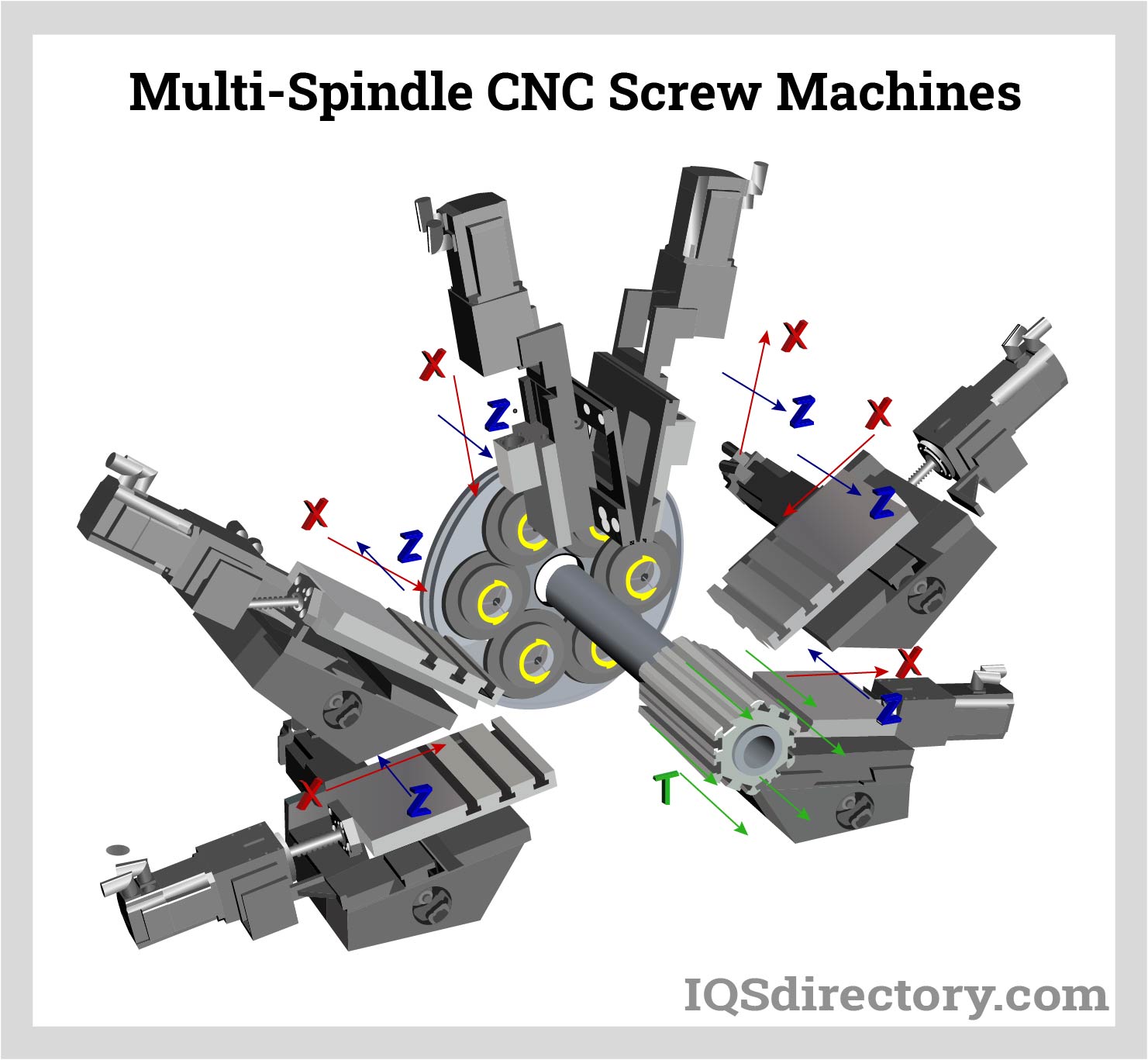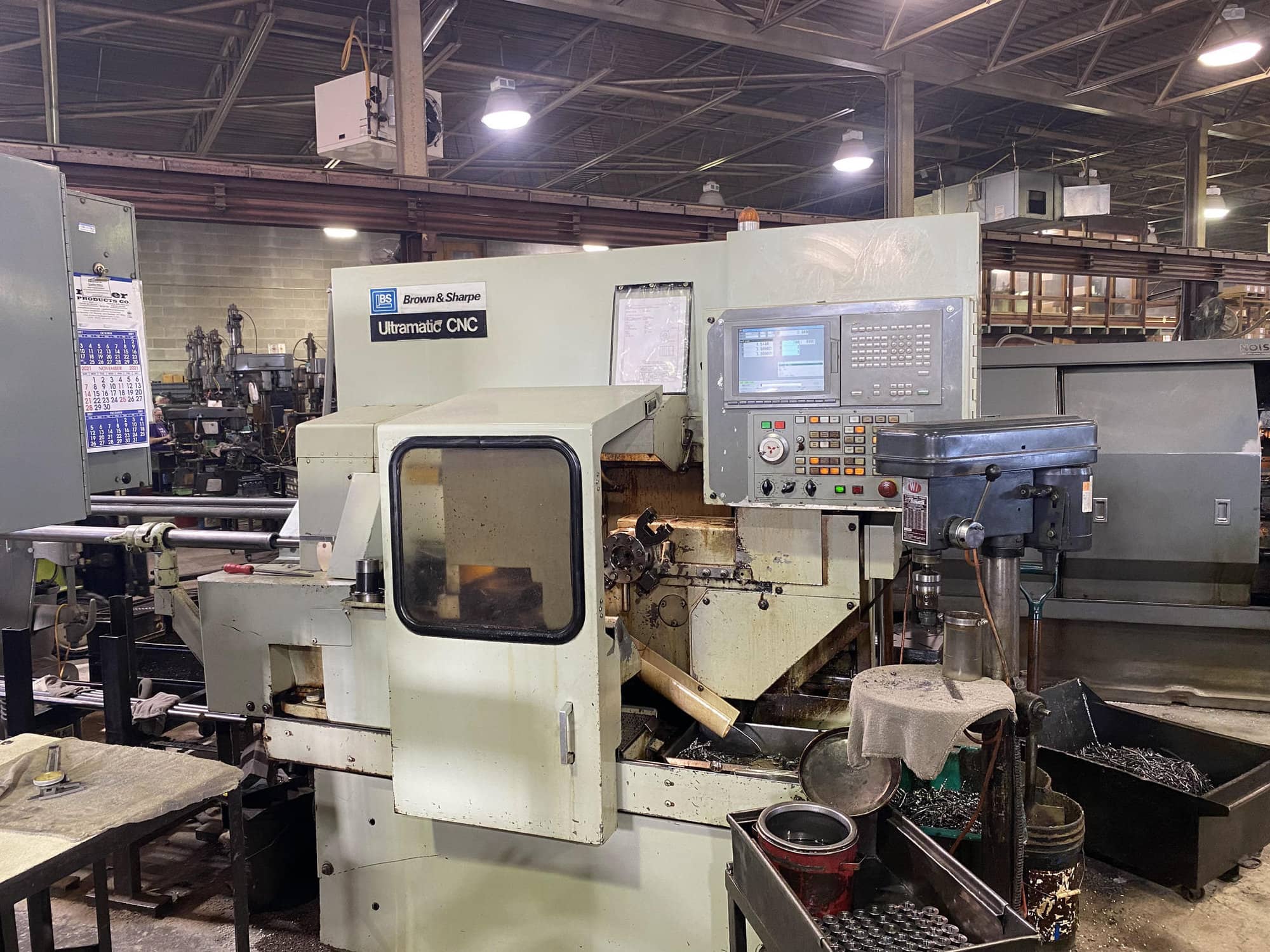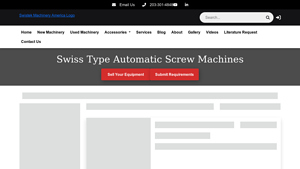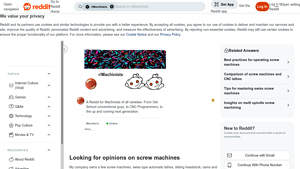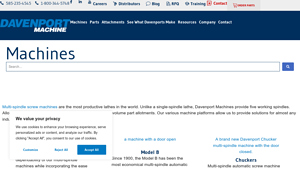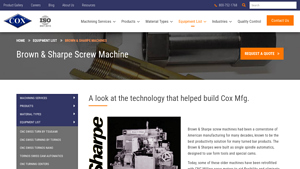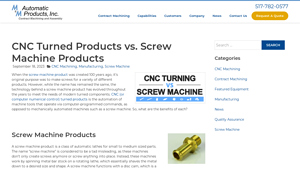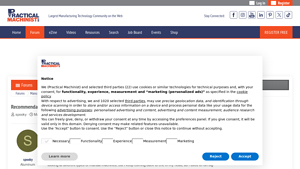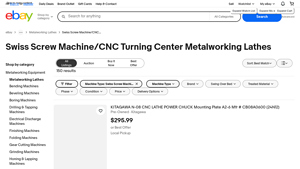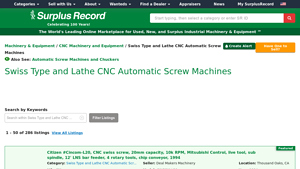Introduction: Navigating the Global Market for cnc screw machine
In the competitive landscape of manufacturing, sourcing a reliable CNC screw machine can be a daunting challenge for B2B buyers, particularly those operating in rapidly evolving markets across Africa, South America, the Middle East, and Europe. The precision and efficiency of CNC screw machines are critical for producing high-quality components, yet the myriad options available can complicate the purchasing process. This guide aims to demystify the complexities of CNC screw machines, providing insights into various types—including Swiss-type and multi-slide models—along with their specific applications across industries such as aerospace, automotive, and medical devices.
Our comprehensive resource will cover essential topics such as supplier vetting strategies, cost considerations, and maintenance requirements, empowering international buyers to make informed decisions tailored to their unique operational needs. By understanding the nuances of CNC screw machines, businesses can enhance their production capabilities, achieve greater precision, and ultimately, secure a competitive edge in their respective markets. Whether you are based in Brazil, Nigeria, or elsewhere, this guide serves as a critical tool for navigating the global market and ensuring that your investment in CNC technology meets your production goals.
Understanding cnc screw machine Types and Variations
| Type Name | Key Distinguishing Features | Primary B2B Applications | Brief Pros & Cons for Buyers |
|---|---|---|---|
| Swiss Type Screw Machine | Multiple tool holders, high precision, short cycle times | Medical devices, electronics | Pros: High accuracy, great for small parts. Cons: Higher initial investment. |
| Multi-Slide CNC Screw Machine | Multiple axes, simultaneous tool operation, high productivity | Automotive, aerospace | Pros: Increased productivity, versatile. Cons: Complex setup and operation. |
| Twin-Spindle CNC Machine | Dual spindles for simultaneous operations, high speed | High-volume production, fasteners | Pros: Efficient for bulk production. Cons: Requires skilled operators. |
| CNC Lathe | Computer-controlled, versatile cutting operations | General machining, prototypes | Pros: Flexible for various parts. Cons: May lack the speed of specialized machines. |
| Multi-Axis CNC Machine | Enhanced movement capabilities, suitable for complex parts | Aerospace, custom components | Pros: High precision for intricate designs. Cons: Higher maintenance costs. |
What Are the Characteristics of Swiss Type Screw Machines?
Swiss Type Screw Machines are renowned for their ability to produce small, high-precision parts with rapid cycle times. They feature multiple tool holders arranged radially around the spindle, allowing for precise cuts and efficient machining. Ideal for industries such as medical devices and electronics, these machines excel in producing intricate components like screws and pins. When considering a Swiss Type machine, buyers should assess their production volumes and the complexity of parts, as the investment is justified by the quality and speed it offers.
How Do Multi-Slide CNC Screw Machines Enhance Productivity?
Multi-Slide CNC Screw Machines utilize multiple axes and simultaneous tool operations, making them highly productive for high-volume manufacturing. These machines can overlap tools, enabling them to perform various operations concurrently, thus significantly reducing cycle times. Commonly used in the automotive and aerospace industries, their versatility allows for the manufacturing of complex parts with tight tolerances. Buyers should evaluate their operational needs and potential return on investment, as these machines can streamline production but may require a higher initial investment and skilled personnel.
Why Choose Twin-Spindle CNC Machines for Bulk Production?
Twin-Spindle CNC Machines are designed for high-speed operations, featuring dual spindles that allow for simultaneous machining processes. This configuration is particularly beneficial for industries requiring high-volume production, such as fasteners and automotive components. While they provide significant efficiency gains, potential buyers should consider the need for skilled operators to manage the complexity of these machines. The upfront costs can be high, but the productivity gains often lead to a favorable return on investment.
What Makes CNC Lathes a Versatile Choice for Manufacturers?
CNC Lathes are versatile machines capable of performing a wide range of cutting operations, making them suitable for general machining and prototype development. They can handle various materials and part sizes, offering flexibility in production. However, compared to specialized screw machines, they may not match the speed required for high-volume runs. Buyers should assess their production requirements and consider CNC lathes as a cost-effective solution for diverse machining tasks, especially when precision is less critical.
How Do Multi-Axis CNC Machines Cater to Complex Parts?
Multi-Axis CNC Machines are equipped with enhanced movement capabilities, allowing for intricate machining operations that are often required in aerospace and custom component manufacturing. Their ability to navigate complex geometries makes them suitable for producing parts with high precision. However, these machines come with higher maintenance costs and may require specialized training for operators. Buyers should weigh the benefits of precision and complexity against the operational costs and maintenance requirements when considering these machines for their production lines.
Key Industrial Applications of cnc screw machine
| Industry/Sector | Specific Application of CNC Screw Machine | Value/Benefit for the Business | Key Sourcing Considerations for this Application |
|---|---|---|---|
| Aerospace | Manufacturing precision components | High accuracy and reliability in critical parts | Certification standards, material specifications |
| Automotive | Production of fasteners and fittings | Increased production speed and reduced waste | Volume requirements, tooling compatibility |
| Medical Devices | Fabrication of surgical instruments | Compliance with stringent quality regulations | Biocompatibility, precision tolerances |
| Electronics | Production of connectors and housings | High-volume production with low defect rates | Customization needs, lead times |
| Oil & Gas | Manufacturing valve components | Enhanced durability and performance under pressure | Material grade, certification for hazardous environments |
How is CNC Screw Machine Used in Aerospace?
In the aerospace industry, CNC screw machines are pivotal for manufacturing precision components such as brackets, fittings, and fasteners that meet strict regulatory standards. These machines ensure high accuracy and reliability, critical for safety in aviation. International buyers must consider certification standards and material specifications to ensure compliance with aerospace regulations, which vary significantly across regions.
What Role Does CNC Screw Machine Play in Automotive Production?
CNC screw machines are extensively utilized in the automotive sector for producing various fasteners and fittings, such as bolts and screws. These machines enable manufacturers to achieve increased production speeds while minimizing waste, which is vital in a competitive market. Buyers should evaluate volume requirements and tooling compatibility to optimize production efficiency and maintain quality.
How is CNC Screw Machine Essential for Medical Device Manufacturing?
In the medical devices sector, CNC screw machines are essential for fabricating surgical instruments that require high precision and adherence to stringent quality regulations. The capability to produce complex geometries with tight tolerances ensures that medical devices perform reliably. Buyers must focus on biocompatibility and precise tolerances, as well as the ability to meet regulatory standards specific to their region.
Why are CNC Screw Machines Important in Electronics Production?
CNC screw machines play a critical role in the electronics industry by facilitating the production of connectors and housings with high precision and repeatability. This capability is crucial for maintaining low defect rates in high-volume production environments. Buyers should consider customization needs and lead times when sourcing CNC screw machines to ensure they can meet market demands effectively.
What are the Applications of CNC Screw Machines in Oil & Gas?
In the oil and gas industry, CNC screw machines are used to manufacture durable valve components that can withstand extreme pressure and harsh environments. The precision and reliability of these machines enhance the performance of critical components, reducing the risk of failures. Buyers need to focus on material grades and certifications for hazardous environments to ensure the safety and reliability of their products.
3 Common User Pain Points for ‘cnc screw machine’ & Their Solutions
Scenario 1: Difficulty in Achieving Precision in High-Volume Production
The Problem: Many B2B buyers face challenges in achieving the required precision while maintaining high production volumes. This is particularly crucial in industries such as aerospace and automotive, where even minor deviations can lead to significant quality issues and increased costs. Buyers often find that traditional CNC machines may not be capable of the high tolerances required for small, intricate components, leading to frequent rework and waste.
The Solution: To overcome this issue, B2B buyers should consider investing in advanced CNC screw machines, such as multi-slide or Swiss-type screw machines. These machines are designed specifically for high-precision applications and can handle complex geometries with tight tolerances. When sourcing these machines, buyers should look for features like multiple tool holders and the ability to perform overlapping tool operations. It’s essential to work closely with suppliers to specify the exact requirements for the parts being produced, including tolerances, materials, and production volumes. Furthermore, investing in operator training can significantly enhance the machine’s capabilities, ensuring that staff are adept at maximizing the machine’s precision features.
Scenario 2: High Operational Costs Due to Inefficient Production Processes
The Problem: B2B manufacturers often struggle with high operational costs attributed to inefficient production processes. Outdated machines may have longer cycle times, leading to increased labor and energy expenses, which can erode profit margins. Buyers may find themselves at a competitive disadvantage if they cannot optimize their production efficiency.
The Solution: To address this pain point, buyers should evaluate their current CNC screw machine setup and consider upgrading to newer, more efficient models. For instance, modern CNC screw machines, like those with twin-spindle configurations, allow for simultaneous operations, significantly reducing cycle times. When selecting new machinery, it’s vital to assess the machine’s specifications, including spindle speed, tool capacity, and automation features. Additionally, integrating IoT technology can provide real-time data analytics on machine performance, enabling manufacturers to identify bottlenecks and optimize workflows. Regular maintenance and investing in preventive measures can also prolong machine life and maintain operational efficiency.
Scenario 3: Limited Flexibility for Diverse Product Lines
The Problem: As market demands shift, many B2B manufacturers find it challenging to adapt their production lines to accommodate a wider variety of products. CNC screw machines that are not versatile enough to handle different sizes and shapes can lead to missed opportunities and increased downtime during changeovers.
The Solution: To enhance flexibility, B2B buyers should consider CNC screw machines with multi-axis capabilities and modular designs. These machines can be easily reconfigured for different production runs, allowing manufacturers to switch between product types without extensive downtime. When researching options, buyers should inquire about the machine’s adaptability to various materials and part configurations. Additionally, investing in a robust training program for operators can ensure they are capable of quickly adjusting setups for different products. Collaborating with machine suppliers to understand the full range of capabilities can also help buyers make informed decisions that align with their production needs.
By proactively addressing these common pain points, B2B buyers can optimize their operations and enhance their competitive edge in the global marketplace.
Strategic Material Selection Guide for cnc screw machine
What Are the Key Materials Used in CNC Screw Machines?
When selecting materials for CNC screw machines, it is crucial to consider the properties and suitability of each material in relation to the intended application. Below, we analyze four common materials used in CNC screw machine manufacturing, detailing their key properties, advantages, disadvantages, and specific considerations for international B2B buyers.
1. Stainless Steel
Key Properties:
Stainless steel is renowned for its excellent corrosion resistance, high tensile strength, and ability to withstand high temperatures. It typically has a temperature rating of up to 870°C (1600°F) and can endure pressures up to 3000 psi, making it suitable for various industrial applications.
Pros & Cons:
The durability of stainless steel is a significant advantage, particularly in environments exposed to moisture or corrosive substances. However, its higher cost compared to other materials can be a drawback, especially for high-volume production. Additionally, machining stainless steel can be more complex due to its hardness, potentially increasing manufacturing time.
Impact on Application:
Stainless steel is ideal for applications requiring high hygiene standards, such as in the food and medical industries. It is compatible with various media, including water and chemicals, making it versatile.
Considerations for International Buyers:
Buyers should ensure compliance with international standards such as ASTM A240 or DIN 1.4301. In regions like Africa and South America, sourcing quality stainless steel can be challenging, necessitating reliable suppliers.
2. Aluminum
Key Properties:
Aluminum boasts a low density, high strength-to-weight ratio, and excellent thermal and electrical conductivity. It can withstand temperatures up to 660°C (1220°F) and is non-corrosive, making it suitable for various applications.
Pros & Cons:
The lightweight nature of aluminum allows for faster machining and reduced energy consumption during production. However, it may not be suitable for high-stress applications, as it is less durable than steel. Additionally, aluminum can be more expensive than some other materials, depending on the alloy used.
Impact on Application:
Aluminum is commonly used in aerospace and automotive applications due to its lightweight and strength. It is compatible with various fluids, including oils and fuels, making it a preferred choice in these industries.
Considerations for International Buyers:
Buyers should verify that aluminum alloys meet relevant standards such as ASTM B221 or EN AW-6060. In regions like Europe, preference may lean towards specific aluminum grades for compliance with local regulations.
3. Brass
Key Properties:
Brass is an alloy of copper and zinc, known for its excellent machinability, corrosion resistance, and aesthetic appeal. It performs well under high temperatures, with a melting point around 900°C (1650°F).
Pros & Cons:
Brass is easy to machine and offers good conductivity, making it ideal for electrical applications. However, it is more expensive than steel and can be less durable under extreme conditions, limiting its use in high-stress applications.
Impact on Application:
Brass is often used in plumbing fittings and electrical components due to its corrosion resistance and conductivity. It is compatible with water and various gases, making it suitable for diverse applications.
Considerations for International Buyers:
Compliance with standards such as ASTM B16 or JIS H3250 is essential. Buyers in the Middle East should be aware of local preferences for brass quality and sourcing options.
4. Carbon Steel
Key Properties:
Carbon steel is known for its high strength and durability, with a temperature rating of up to 540°C (1000°F). It is less resistant to corrosion compared to stainless steel but offers excellent machinability.
Pros & Cons:
The affordability and strength of carbon steel make it a popular choice for many applications. However, its susceptibility to rust can be a significant drawback, necessitating protective coatings or treatments.
Impact on Application:
Carbon steel is commonly used in construction and manufacturing applications where strength is critical. It is compatible with various media, including water and oils, but requires careful handling to prevent corrosion.
Considerations for International Buyers:
Buyers should ensure compliance with ASTM A36 or DIN 17100 standards. In regions like Brazil and Nigeria, sourcing reliable carbon steel can be crucial for maintaining quality standards.
Summary Table
| Material | Typical Use Case for cnc screw machine | Key Advantage | Key Disadvantage/Limitation | Relative Cost (Low/Med/High) |
|---|---|---|---|---|
| Stainless Steel | Medical devices, food processing | Excellent corrosion resistance | Higher cost, complex machining | High |
| Aluminum | Aerospace, automotive components | Lightweight, good conductivity | Less durable under stress | Medium |
| Brass | Plumbing fittings, electrical components | Excellent machinability | Higher cost, less durable | Medium |
| Carbon Steel | Construction, manufacturing applications | High strength, affordability | Susceptible to corrosion | Low |
This strategic material selection guide aims to empower B2B buyers with the insights needed to make informed decisions when sourcing materials for CNC screw machines, considering both performance and regional compliance factors.
In-depth Look: Manufacturing Processes and Quality Assurance for cnc screw machine
What Are the Main Stages in the Manufacturing Process of CNC Screw Machines?
The manufacturing process for CNC screw machines encompasses several key stages that ensure precision and quality in the final product. Understanding these stages can help B2B buyers assess suppliers and their capabilities.
1. Material Preparation
The first step involves selecting the right materials, which typically include high-grade metals such as steel, aluminum, or brass. These materials must undergo thorough inspection to ensure they meet the required specifications. Common practices in this stage include:
- Material Testing: Buyers should inquire about the methods used for verifying material quality, such as tensile strength tests or metallurgical analysis.
- Cutting: The raw materials are cut to manageable sizes using high-precision saws or shears, ensuring minimal waste and uniformity.
2. Forming
In this stage, the machined parts are shaped through various processes, including turning, milling, and drilling. CNC technology allows for the precise control of tools, which is crucial for maintaining tight tolerances. Key techniques include:
- CNC Turning: The workpiece is rotated while cutting tools remove material, creating cylindrical shapes. This method is integral for producing screws and bolts.
- Multi-Axis Machining: Advanced CNC screw machines can operate on multiple axes simultaneously, enhancing productivity and complexity in part designs.
3. Assembly
After individual components are manufactured, they are assembled into the final machine. This process may involve:
- Component Fitting: Precision is critical here; components must fit together seamlessly to ensure the machine’s functionality.
- Calibration: Each machine undergoes calibration to align and adjust components for optimal performance.
4. Finishing
Finishing processes enhance the aesthetic and functional qualities of the CNC screw machine. This stage includes:
- Surface Treatment: Techniques such as anodizing or plating improve corrosion resistance and surface finish.
- Final Inspection: Before shipping, machines undergo a final quality check to ensure they meet all specifications.
How Is Quality Assurance Ensured Throughout the Manufacturing Process?
Quality assurance (QA) is vital in the production of CNC screw machines, ensuring that products meet international standards and customer expectations.
International Standards for Quality Assurance
Many manufacturers adhere to international standards such as ISO 9001, which outlines requirements for a quality management system. This certification is crucial for B2B buyers as it indicates a commitment to quality and continuous improvement.
Industry-Specific Certifications
In addition to general standards, certain industries require specialized certifications. For example:
- CE Marking: For products sold in the European market, CE marking indicates compliance with health, safety, and environmental protection standards.
- API Certification: Relevant for manufacturers supplying the oil and gas industry, ensuring that products meet specific performance standards.
What Are the Key Quality Control Checkpoints in the Manufacturing Process?
Quality control (QC) is implemented at various stages of the manufacturing process, with specific checkpoints designed to catch issues before they escalate.
Incoming Quality Control (IQC)
Before production begins, materials are inspected to verify their quality. This includes checking for defects and ensuring that materials meet specified standards.
In-Process Quality Control (IPQC)
During manufacturing, ongoing inspections occur to monitor the production process. Techniques include:
- Statistical Process Control (SPC): This method uses statistical tools to monitor and control the manufacturing process.
- Visual Inspections: Operators conduct regular checks to identify any deviations from specifications.
Final Quality Control (FQC)
Once production is complete, a thorough inspection is performed to ensure that all machines meet quality standards before they are shipped. This may involve:
- Functional Testing: Each machine undergoes performance tests to confirm that it operates according to specifications.
- Dimensional Inspection: Measuring tools verify that all components are within acceptable tolerances.
How Can B2B Buyers Verify Supplier Quality Control Practices?
For international B2B buyers, especially from regions like Africa, South America, the Middle East, and Europe, verifying supplier quality control practices is essential. Here are actionable steps:
Conduct Supplier Audits
Buyers should request to perform on-site audits of potential suppliers. This allows them to assess the quality management systems in place, including:
- Documentation: Review of quality assurance records and compliance with international standards.
- Process Observations: Observing manufacturing processes can provide insights into the reliability and consistency of production.
Request Quality Reports
Suppliers should be able to provide quality assurance reports that detail:
- Test Results: Results from various tests conducted throughout the manufacturing process.
- Compliance Certifications: Documentation showing adherence to relevant standards and certifications.
Utilize Third-Party Inspections
Engaging third-party inspection services can offer an additional layer of assurance. These independent organizations can conduct assessments of the manufacturing process and product quality, providing unbiased reports that help buyers make informed decisions.
What Are the Nuances of Quality Control for International B2B Buyers?
B2B buyers from diverse regions face unique challenges regarding quality control. Understanding these nuances can aid in making better purchasing decisions.
Regulatory Compliance
Each region may have different regulatory requirements. For example, products exported to the EU must comply with CE marking, while those in the Middle East may need to meet GSO standards. Buyers must ensure that suppliers are aware of and comply with these regulations.
Cultural Considerations
Cultural differences can impact business practices and expectations regarding quality. Buyers should communicate their quality requirements clearly and establish mutual understanding with suppliers.
Building Long-Term Relationships
Fostering strong relationships with suppliers can lead to better quality control. Buyers should engage in ongoing communication, providing feedback and discussing potential improvements in quality processes.
By understanding the manufacturing processes and quality assurance practices associated with CNC screw machines, B2B buyers can make informed decisions that align with their operational needs and compliance requirements.
Practical Sourcing Guide: A Step-by-Step Checklist for ‘cnc screw machine’
Introduction
This practical sourcing guide serves as a comprehensive checklist for B2B buyers looking to procure CNC screw machines. Given the complexity and precision required in manufacturing, this guide will help streamline your procurement process, ensuring that you make informed decisions that align with your operational needs and budget constraints.
Step 1: Define Your Technical Specifications
Begin by outlining the specific technical requirements for the CNC screw machine you need. Consider factors such as part size, complexity, and material types.
– What to look for: Identify the spindle size, number of axes, and the types of tools required for your production needs. A clear specification will help you communicate effectively with suppliers.
Step 2: Research Different Machine Types
Familiarize yourself with the various types of CNC screw machines available, such as Swiss-type and multi-slide machines. Each type has unique features and advantages.
– Why it matters: Understanding the differences will help you select a machine that best fits your production volume and part complexity. For instance, Swiss-type machines are ideal for high-precision, small parts.
Step 3: Evaluate Potential Suppliers
Conduct thorough evaluations of potential suppliers before making a commitment. Request detailed company profiles, product catalogs, and customer testimonials.
– What to check: Look for suppliers with a solid reputation in your industry. Ask for case studies or references from businesses that have similar requirements to yours.
Step 4: Verify Supplier Certifications
Ensure that the suppliers you are considering have the necessary certifications and compliance with international standards. This may include ISO certifications or industry-specific accreditations.
– Why it’s important: Certification ensures that the machines meet safety and quality standards, which is crucial for maintaining your production integrity and avoiding costly downtimes.
Step 5: Request Demonstrations or Samples
Whenever possible, request live demonstrations or samples of the CNC screw machines you are considering. Observing the machine in action can provide insights into its performance.
– What to look for: Pay attention to the machine’s speed, precision, and ease of operation. This hands-on experience can be a deciding factor in your purchasing decision.
Step 6: Assess After-Sales Support and Warranty
Evaluate the after-sales support and warranty options provided by the supplier. A robust support system can significantly impact your operational efficiency.
– Key considerations: Look for suppliers that offer comprehensive training, maintenance services, and a clear warranty policy. This will ensure that you have the necessary resources to maximize your machine’s lifespan.
Step 7: Compare Pricing and Financing Options
Finally, compare pricing across different suppliers while considering the total cost of ownership, including maintenance and operational costs. Explore financing options if necessary.
– Why it matters: Make sure to factor in not just the initial purchase price but also long-term operational expenses. This comprehensive approach will help you make a financially sound decision.
By following these steps, you can ensure a strategic approach to sourcing CNC screw machines that meets your specific manufacturing needs.
Comprehensive Cost and Pricing Analysis for cnc screw machine Sourcing
When sourcing CNC screw machines, understanding the comprehensive cost structure and pricing dynamics is crucial for international B2B buyers. This analysis delves into the various cost components, price influencers, and strategic tips for effective negotiation, particularly for buyers in regions such as Africa, South America, the Middle East, and Europe.
What Are the Key Cost Components for CNC Screw Machines?
Materials: The cost of raw materials, including high-grade steel and other alloys, significantly impacts the overall price of CNC screw machines. The quality of these materials affects durability and performance, making it essential for buyers to assess their specifications closely.
Labor: Labor costs encompass both the manufacturing workforce and skilled technicians necessary for machine setup, operation, and maintenance. In regions where skilled labor is scarce or more expensive, this can substantially raise the cost of the machines.
Manufacturing Overhead: This includes indirect costs such as utilities, rent, and administrative expenses associated with production. Buyers should inquire about the manufacturer’s overhead allocation, as it can vary widely between suppliers.
Tooling: Tooling costs involve the specialized equipment and tools required for manufacturing specific parts. Custom tooling can add significant expense, so buyers should evaluate if standard tooling meets their needs to minimize costs.
Quality Control (QC): Implementing rigorous QC processes is vital for ensuring machine reliability and precision. The costs associated with testing and certifications can add to the final price. Buyers should prioritize suppliers with robust QC protocols to ensure long-term value.
Logistics: Shipping and handling costs, especially for international transactions, can be substantial. Factors such as shipping distance, mode of transport, and import duties must be factored into the total cost.
Margin: Suppliers will also include their profit margin in the pricing. Understanding the typical margins in the CNC machine market can aid in assessing whether a quote is competitive.
What Influences CNC Screw Machine Prices?
Volume/MOQ: Minimum order quantities (MOQ) and order volume play significant roles in pricing. Larger orders often lead to discounts, making it beneficial for companies anticipating high demand.
Specifications and Customization: Custom machines with specific features or capabilities command higher prices. Buyers should clearly define their needs to avoid over-specifying and incurring unnecessary costs.
Materials and Quality Certifications: Machines built with premium materials or those that meet specific industry certifications (e.g., ISO standards) may be priced higher. However, investing in quality can lead to lower maintenance costs and longer machine life.
Supplier Factors: The reputation and reliability of the supplier can also influence pricing. Established suppliers may charge more due to their track record of quality and service. Buyers should balance cost with supplier reliability.
Incoterms: The agreed Incoterms (International Commercial Terms) can affect the total landed cost. Terms like FOB (Free On Board) or CIF (Cost, Insurance, and Freight) dictate who is responsible for shipping and insurance, impacting overall expenses.
How Can Buyers Negotiate Effectively for CNC Screw Machines?
Understand Total Cost of Ownership (TCO): Buyers should consider not just the initial purchase price but also the long-term costs associated with maintenance, operation, and potential downtime. A higher upfront cost may be justified by lower operational costs over time.
Leverage Volume Discounts: When feasible, consolidating orders can lead to significant savings. Establishing a long-term relationship with suppliers may also yield better pricing and terms.
Be Aware of Pricing Nuances for International Buyers: Currency fluctuations, import tariffs, and regional economic conditions can impact pricing. It’s essential for buyers from regions like Africa and South America to factor these elements into their budgeting.
Request Multiple Quotes: Obtaining quotes from several suppliers can provide a clearer picture of the market and help identify competitive pricing. It also serves as a negotiation tool to leverage better terms.
Disclaimer on Indicative Prices
It is important to note that prices for CNC screw machines can vary widely based on the factors discussed above. Buyers are encouraged to conduct thorough market research and consult multiple suppliers to obtain accurate and current pricing information tailored to their specific needs.
Alternatives Analysis: Comparing cnc screw machine With Other Solutions
Exploring Alternative Solutions to CNC Screw Machines
In the realm of precision machining, understanding the available alternatives to CNC screw machines is crucial for B2B buyers looking to optimize their production capabilities. While CNC screw machines are renowned for their precision and efficiency in producing small to medium-sized cylindrical parts, other technologies may offer distinct advantages depending on specific manufacturing needs. This section will compare CNC screw machines with two viable alternatives: Swiss screw machines and CNC lathes.
Comparison Table
| Comparison Aspect | CNC Screw Machine | Swiss Screw Machine | CNC Lathe |
|---|---|---|---|
| Performance | High-speed, multi-tool capability | Superior precision for small parts | Versatile, good for larger parts |
| Cost | High initial investment | Moderate to high investment | Lower initial cost, but variable |
| Ease of Implementation | Requires skilled operators | Complex setup, skilled labor necessary | Easier to set up and operate |
| Maintenance | Regular maintenance needed | High maintenance due to precision components | Generally lower maintenance |
| Best Use Case | High-volume, complex parts | High precision small parts | Versatile applications, larger parts |
Detailed Breakdown of Alternatives
What are the Benefits and Drawbacks of Swiss Screw Machines?
Swiss screw machines excel in producing extremely precise and intricate components, making them ideal for industries such as medical devices and electronics where micro-sized parts are common. Their design allows for rapid production with exceptional accuracy, significantly reducing cycle times. However, the complexity of Swiss screw machines often requires highly skilled operators, which can increase labor costs. Additionally, their initial investment is generally higher than that of CNC screw machines, making them a more significant financial commitment.
How Do CNC Lathes Compare to CNC Screw Machines?
CNC lathes offer versatility and are suitable for various part sizes, ranging from small to large cylindrical shapes. They are easier to set up and operate compared to CNC screw machines, making them a popular choice for shops with varying production needs. The initial cost of CNC lathes is often lower, which can be appealing for businesses with budget constraints. However, they may not achieve the same level of precision as CNC screw machines or Swiss screw machines, especially for high-volume production runs requiring tight tolerances.
Conclusion: Which Solution is Right for Your B2B Needs?
When selecting the right machining solution, B2B buyers must consider their specific production requirements, including part complexity, volume, and budget. CNC screw machines are optimal for high-volume production with complex parts, while Swiss screw machines shine in precision applications for smaller components. On the other hand, CNC lathes provide flexibility for a broader range of part sizes, making them suitable for businesses that require adaptability. By carefully evaluating these factors, manufacturers can make informed decisions that align with their operational goals and enhance overall productivity.
Essential Technical Properties and Trade Terminology for cnc screw machine
What Are the Key Technical Properties of CNC Screw Machines?
When considering the acquisition of CNC screw machines, understanding their critical technical specifications is vital for ensuring they meet your production needs. Here are several key properties to consider:
-
Material Grade: The quality of materials used in the construction of CNC screw machines significantly impacts their durability and performance. Common materials include high-grade steel and cast iron, which provide stability and resistance to wear. For B2B buyers, choosing machines with superior material grades ensures longevity and reduces maintenance costs.
-
Tolerance Levels: Tolerance refers to the permissible limit of variation in a physical dimension. CNC screw machines are known for their ability to achieve tight tolerances (often within ±0.001 inches or finer). This precision is crucial for industries such as aerospace and medical devices, where even minor deviations can lead to significant issues. For manufacturers, investing in machines with high tolerance capabilities can enhance product quality and reduce waste.
-
Spindle Size: Spindle size determines the diameter of the workpieces the machine can handle. CNC screw machines typically range from small spindles (around 36mm) to larger ones (up to 100mm). Understanding the spindle size is essential for businesses that produce varying part sizes, as it influences the types of components you can manufacture.
-
Axis Configuration: The number of axes a CNC screw machine operates on can affect its versatility and complexity. Machines with more axes (like 11 or 12 axes) allow for more intricate machining operations, enabling the production of complex parts in a single setup. This capability can lead to reduced cycle times and increased efficiency in high-volume production environments.
-
Cycle Time: This metric measures the time it takes to complete one machining operation. Shorter cycle times enhance productivity, especially in high-volume manufacturing. For businesses focused on efficiency, selecting machines with optimized cycle times can significantly impact overall operational costs and output rates.
-
Power Consumption: Understanding a machine’s power requirements is crucial for operational budgeting. Machines that are more energy-efficient can lower overall costs, making them more appealing for businesses aiming for sustainability and cost-effectiveness.
What Are Common Trade Terms in CNC Screw Machine Transactions?
Familiarizing yourself with industry jargon can streamline communication and negotiations. Here are several essential terms often encountered in CNC screw machine dealings:
-
OEM (Original Equipment Manufacturer): This term refers to companies that produce parts or equipment that may be marketed by another manufacturer. Understanding whether a supplier is an OEM can help buyers assess product quality and reliability.
-
MOQ (Minimum Order Quantity): MOQ defines the smallest quantity of a product that a supplier is willing to sell. This term is crucial for budget-conscious buyers, as it impacts inventory management and initial investment costs.
-
RFQ (Request for Quotation): An RFQ is a formal process where a buyer solicits pricing and terms from suppliers. This document typically outlines the specifications and quantities required. For businesses, issuing an RFQ can facilitate better pricing negotiations and supplier comparisons.
-
Incoterms (International Commercial Terms): These are predefined commercial terms published by the International Chamber of Commerce that clarify the responsibilities of buyers and sellers in international transactions. Knowing the applicable Incoterms can help buyers understand shipping responsibilities, costs, and risks involved in the procurement process.
-
Lead Time: This term indicates the time from placing an order to receiving the product. Understanding lead times is essential for production planning and inventory management, particularly for industries with tight deadlines.
-
After-Sales Support: This encompasses services provided after a purchase, including maintenance, training, and technical support. For B2B buyers, reliable after-sales support is crucial for maximizing the return on investment in machinery.
Understanding these technical specifications and trade terms can empower decision-makers to make informed purchases, ensuring that the CNC screw machines acquired align with their operational needs and business goals.
Navigating Market Dynamics and Sourcing Trends in the cnc screw machine Sector
What Are the Key Market Drivers and Trends in the CNC Screw Machine Sector?
The CNC screw machine market is witnessing significant growth, driven by the increasing demand for precision-engineered components across various industries, including automotive, aerospace, and electronics. Globalization has led to a surge in international trade, prompting manufacturers to seek reliable and efficient machining solutions. Emerging technologies such as Industry 4.0 and the Internet of Things (IoT) are reshaping traditional manufacturing processes, enabling real-time monitoring and predictive maintenance, which enhance operational efficiency and reduce downtime.
In regions like Africa, South America, the Middle East, and Europe, there is a growing trend towards automation and smart manufacturing. This shift is particularly evident in countries like Brazil and Nigeria, where local industries are adopting CNC screw machines to improve production capacity and quality. Additionally, the rise of multi-slide and twin-spindle CNC machines offers manufacturers the ability to produce complex parts with shorter cycle times, making them increasingly attractive for high-volume production runs.
International buyers are also becoming more discerning, prioritizing suppliers that offer comprehensive service packages, including training, maintenance, and support. This shift underscores the importance of building long-term partnerships with reliable manufacturers who can provide not only machines but also the necessary expertise to optimize production processes.
How Are Sustainability and Ethical Sourcing Impacting the CNC Screw Machine Industry?
Sustainability is becoming a central theme in the CNC screw machine sector, with increasing pressure from consumers and regulatory bodies for manufacturers to adopt environmentally responsible practices. The production of CNC machines often involves significant energy consumption and waste generation. Therefore, manufacturers are focusing on creating energy-efficient machines that minimize environmental impact.
Ethical sourcing of materials is also gaining traction. Buyers are now more aware of the importance of ensuring that their supply chains are sustainable and ethically sound. This includes seeking suppliers who utilize recycled materials or those with ‘green’ certifications. The use of eco-friendly lubricants and cutting fluids in the machining process is another area where companies are making strides towards sustainability.
Moreover, as markets in regions like Africa and South America grow, international buyers are increasingly looking for suppliers who demonstrate commitment to social responsibility, including fair labor practices and community engagement. Such practices not only enhance brand reputation but also align with the values of modern consumers, making ethical sourcing a competitive differentiator in the market.
How Has the CNC Screw Machine Evolved Over Time?
The evolution of CNC screw machines can be traced back to the late 1800s when Swiss watchmakers developed automatic lathes to produce precision components. Originally designed for mass production of small parts like screws, these machines have significantly advanced with the advent of computer numerical control technology.
Modern CNC screw machines are characterized by their ability to perform multiple operations simultaneously, drastically reducing cycle times and enhancing precision. The introduction of multi-axis and multi-slide configurations has further expanded their capabilities, allowing for the production of complex components with tight tolerances. This evolution reflects the industry’s response to the growing demands for higher efficiency and precision, positioning CNC screw machines as essential tools in contemporary manufacturing environments.
As international B2B buyers navigate this dynamic landscape, understanding these trends and the historical context of CNC screw machines will be crucial for making informed purchasing decisions that align with their operational goals and sustainability commitments.
Frequently Asked Questions (FAQs) for B2B Buyers of cnc screw machine
-
How do I choose the right CNC screw machine for my production needs?
Selecting the right CNC screw machine involves evaluating several factors. First, consider the type of parts you intend to manufacture; CNC screw machines excel at producing small to medium-sized cylindrical components. Assess your production volume; these machines are designed for high-volume runs. Additionally, examine the precision requirements—if your parts require tight tolerances, a CNC screw machine may be necessary. Lastly, consider your available space and budget to ensure you can accommodate the machine and its operational costs. -
What are the key benefits of using a CNC screw machine?
CNC screw machines offer numerous advantages, including high precision, repeatability, and efficiency. They are capable of producing complex parts with tight tolerances, making them ideal for industries such as aerospace, automotive, and medical devices. The automation allows for reduced labor costs and shorter cycle times, increasing overall productivity. Furthermore, their ability to perform multiple machining operations simultaneously can significantly enhance production capabilities, providing a competitive edge in the market. -
What types of materials can be processed with CNC screw machines?
CNC screw machines are versatile and can work with a variety of materials, including metals such as aluminum, brass, steel, and titanium. They are also capable of machining plastics and composites, depending on the machine’s specifications. The choice of material will influence the machining process, tooling, and cutting speeds required. It’s essential to select a machine that is compatible with the materials you plan to use to ensure optimal performance and product quality. -
What is the typical lead time for ordering a CNC screw machine?
Lead times for ordering a CNC screw machine can vary widely based on several factors, including the machine’s specifications, customization requirements, and the supplier’s inventory. Generally, standard machines may have a lead time of 6 to 12 weeks, while custom configurations could take longer. It is advisable to discuss timelines with your supplier early in the procurement process to align your production schedule with the machine’s availability. -
How do I vet suppliers when purchasing a CNC screw machine internationally?
Vetting suppliers is crucial when sourcing CNC screw machines internationally. Begin by researching their reputation and track record in the industry, looking for customer reviews and testimonials. Verify their certifications and compliance with international quality standards, such as ISO. It’s also beneficial to request references from past clients and check their responsiveness and communication skills. Consider visiting their facility if possible or engaging a third-party inspection service to assess their operations and machinery quality. -
What customization options are typically available for CNC screw machines?
Customization options for CNC screw machines can vary by manufacturer but often include modifications to spindle size, tooling configurations, and additional features such as live tooling or automation enhancements. You may also request specific software compatibility or ergonomic designs tailored to your production environment. Discussing your specific needs with the supplier will help determine the best options available to enhance the machine’s functionality for your operations. -
What are common payment terms for purchasing CNC screw machines?
Payment terms can differ by supplier and may include options such as full payment upfront, a deposit followed by balance upon delivery, or financing arrangements. It is essential to clarify payment terms during negotiations to avoid misunderstandings. Consider discussing options that suit your cash flow, and inquire about any warranties or after-sales support included in the purchase to ensure you are protected against potential issues. -
How can I ensure quality assurance when sourcing CNC screw machines?
To ensure quality assurance when sourcing CNC screw machines, start by confirming the supplier’s adherence to international quality standards, such as ISO certifications. Request detailed documentation of the machine’s specifications, performance metrics, and any quality control processes they employ. Additionally, consider conducting pre-shipment inspections and testing the machine’s functionality upon delivery. Establishing a clear communication channel with the supplier regarding any concerns or discrepancies can also facilitate a smoother quality assurance process.
Important Disclaimer & Terms of Use
⚠️ Important Disclaimer
The information provided in this guide, including content regarding manufacturers, technical specifications, and market analysis, is for informational and educational purposes only. It does not constitute professional procurement advice, financial advice, or legal advice.
While we have made every effort to ensure the accuracy and timeliness of the information, we are not responsible for any errors, omissions, or outdated information. Market conditions, company details, and technical standards are subject to change.
B2B buyers must conduct their own independent and thorough due diligence before making any purchasing decisions. This includes contacting suppliers directly, verifying certifications, requesting samples, and seeking professional consultation. The risk of relying on any information in this guide is borne solely by the reader.
Top 8 Cnc Screw Machine Manufacturers & Suppliers List
1. Swistek – Swiss Type Automatic Screw Machines
Domain: swistek.com
Registered: 2010 (15 years)
Introduction: New Swiss Type Automatic Screw Machines for sale from brands including STAR, TSUGAMI, GANESH, HANWHA, SWISTEK, and CITIZEN. Located at Swistek Machinery America, 50 Seemans Lane, Milford, CT, 06460. Contact via phone at 203-301-4848 or 203-301-4849. Offers include new machinery, used machinery, accessories, live tools, inspection services, and cutting oil.
2. Reddit – Swiss Type Automatic Lathes
Domain: reddit.com
Registered: 2005 (20 years)
Introduction: Screw machines, specifically Swiss type automatic lathes and sliding headstock models, are complex machines that require skilled operators for setup and operation. They are noted for their productivity and speed but face challenges due to the declining number of knowledgeable operators. The current trend in job shops favors CNC automatic lathes for low quantity series production (4000 – 10,000 par…
3. Davenport – Multi-Spindle Screw Machines
Domain: davenportmachine.com
Registered: 1996 (29 years)
Introduction: Davenport Multi-Spindle Screw Machines are highly productive lathes featuring five working spindles for significant productivity gains in high volume part allotments. Key models include the Hybrid Machine, which combines mechanical dependability with CNC ease and accuracy; the Model B, known for being the most economical multi-spindle automatic screw machine since 1900; and Chuckers, designed for …
4. Cox Manufacturing – Brown & Sharpe Screw Machines
Domain: coxmanufacturing.com
Registered: 2003 (22 years)
Introduction: Brown & Sharpe Screw Machines are known for their productivity in manufacturing turned bar products. They are single spindle automatics designed to use form tools and special cams. Some machines have been retrofitted with CNC Milling servo motors for flexibility. They are suitable for low to moderate lot sizes, typically a few hundred to a few thousand parts. The machines require special form tool…
5. MMAutomatic – CNC Turned Products
Domain: mmautomatic.com
Registered: 2000 (25 years)
Introduction: CNC Turned Products:
– Created in the 1940s and 1950s, modifying existing tools with motors.
– Operated mainly by computers, allowing for more tooling sets than screw machines.
– Capable of rotating parts at speeds up to and exceeding 10,000 RPM.
– Achieves accuracies as tight as .0002″ of an inch.
– Used in various industries including automotive, aerospace, medical, and agricultural.
Scre…
6. Citizen – CNC Screw Machines for Small Businesses
Domain: practicalmachinist.com
Registered: 2000 (25 years)
Introduction: CNC screw machine recommendations for small businesses making antique gun parts. Key requirements include: 1. Used machines under $10,000. 2. Small footprint, ideally 220V with bar feeder. 3. Capable of making screws like 8-32, 6-40, 10-32, and 1/4-20. 4. Suggested brands include Citizen, Index (Traub), Star, Tornos, and Omniturn. 5. Consideration for C-axis capability for slotting screws. 6. Ment…
7. Swiss Screw Machine – CNC Turning Center
Domain: ebay.com
Registered: 1995 (30 years)
Introduction: Swiss Screw Machine/CNC Turning Center Metalworking Lathes for sale on eBay. Related searches include CNC Swiss Lathe, Central Machinery Metal Lathe, CNC Turning Center Machine, and more. Categories include various types of metalworking equipment such as bending machines, drilling machines, grinding machines, and more.
8. Tsugami – CNC Automatic Screw Machines
Domain: surplusrecord.com
Registered: 1995 (30 years)
Introduction: Used Swiss & Lathe CNC Automatic Screw Machines for Sale. Key Manufacturers: Tsugami (90), Citizen (62), Star (39), Tornos (21), Ganesh (10), Hanwha (10), Swistek (6), DMG (5), Escomatic (5), Traub (5), Genturn (4), Index (4), Nexturn (4), Wickman (4), KSI (2), Miyano (2), Nomura (2). Top Models: Citizen CINCOM-L20 (1994), Citizen FL-42 (2002), Citizen A20-VII (2012), Citizen A20-VII (2019). Locat…
Strategic Sourcing Conclusion and Outlook for cnc screw machine
In navigating the complexities of sourcing CNC screw machines, international buyers must prioritize precision, reliability, and technological advancements. The evolution of CNC screw machines, particularly Swiss-type models, has led to enhanced productivity through features such as multi-axis capabilities and simultaneous tool operations. For manufacturers in Africa, South America, the Middle East, and Europe, understanding these technological nuances is crucial for optimizing production efficiencies and maintaining competitive advantage.
Strategic sourcing not only involves selecting the right machines but also establishing long-term partnerships with reputable manufacturers. By investing in high-quality CNC screw machines, businesses can significantly reduce cycle times and improve the quality of their output, ensuring they meet the rigorous demands of industries such as aerospace, automotive, and medical devices.
As we look ahead, the global manufacturing landscape is poised for further innovation. B2B buyers should actively seek out opportunities to integrate advanced CNC screw machines into their operations, fostering growth and sustainability. Engage with trusted suppliers, evaluate your unique production needs, and take proactive steps toward enhancing your manufacturing capabilities. The future of precision machining is bright—position your business to lead the charge.
